Peter MALONE
Saturday, 18 September 2021 19:21
Taking of Flight 847, The/ The Uli Derickson Story
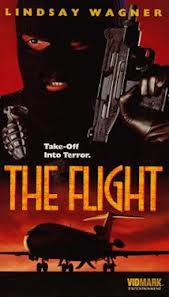
THE TAKING OF FLIGHT 847, THE ULI DERICKSON STORY
US, 1988, 100 minutes, Colour.
Lindsay Wagner, Eli Danker, Ray Wise.
Directed by Paul Wendkos.
The Taking of Flight 847, The Uli Derickson Story, is an interesting telemovie. On the surface it seems like any other disaster movies so popular in the '70s and '80s. However, it is based on fact - and takes up the reality of the hijacking of a TWA flight.
The background information is given - the Middle East, Beirut, Athens. The Shiite hijackers are presented with all their fanaticism as well as their inadequacies. Rival Muslim groups are also presented as the plane has to fly from Athens to Beirut to Algiers and back again.
The film does not have a star cast. Lindsay Wagner is very effective as Uli Dereckson. It means then that the audience is not distracted by stars performing as passengers, guest passengers, or guest terrorists. The terrorists are quite persuasive.
The film was directed by Paul Wendkos, veteran director of many action films and telemovies.
1.The impact of the film? International flying? The possibility of hijacks? Terrorist groups? Security? The effect on the passengers and crew, the effect on public opinion, the effect on governments?
2.The atmosphere of Ule’s home contrasting with the airport, the plane, the flight in air. The focus on the interior of the plane? The presentation of Algiers and Beirut airports? Stunts and special effects? Musical score?
3.How well did the film establish the background - television presentations of terrorism, clashes in the Middle East, Muslim-Christian? tensions, Muslims and their anti-American stances? The place of terrorists and hijackers in the '80s? The vulnerability of international flights?
4.Lindsay Wagner's portrait of Uli - at home with her husband, her son? Strong? Her charm in her work? With the other hostesses? Security? Being calm, handling the situation, her humanity? Concern for the passengers and handling them? Interaction with the two hijackers, the bonds between them, the hijacker wanting to save her life, asking her to sing? The proposal of marriage? Her being allowed to go - and asking for the release of the women in Algiers? What more could she have done? Keeping passengers alive? Helping the wounded? At home, with her husband, the tribute to her? The film highlighting how an ordinary citizen can be heroic and can save lives and help negotiations?
5.The presentation of the hijackers - getting on board at Athens, their tension, the head not making the plane? The takeover of the plane? The violence, the emotion, the fanaticism? Speaking Arabic and German? Uli having to translate? The effect on the audience of hearing the foreign languages? The brutality towards the crew? The plan to go back to Beirut, their not fearing death? The brutality with the passports, the interrogations, bashing the American military man - and later shooting him and throwing him to the tarmac? Their uncertainties and fears? Pressurising the crew? In Beirut, talking to the tower, in Algiers? The rival group coming in and collaborating with them? The personal side, reaction to people, the hijacker's story and the US New Jersey shelling his home and killing his family? Justice and revenge? Uli arguing with him about violence solving anything? His tiredness, wanting her to sing? Letting her go? The portrait of terrorists - making them more real, their fanaticism, their anger, their humanity?
6.The presentation of the crew, reaction, training, difficulties, fuel, landing in Beirut without the lights? The obeying of hijackers? The physical brutality suffered? The stewardesses and their concern, helping the passengers?
7.The range of the passengers - ordinary, US, the pregnant woman, the mother with her child, the military men? The Jewish names? Uli having to go through the passports, read out the names? Those who suffered brutality? The man who was killed? The woman who was concerned about the mothers?
8.The media and their coverage of the crisis? The airport officials and their reactions? Political implications?
9.A drama about hijacking, about human response, about causes and responsibilities?
Published in Movie Reviews
Published in
Movie Reviews
Tagged under
Saturday, 18 September 2021 19:21
Tycoon
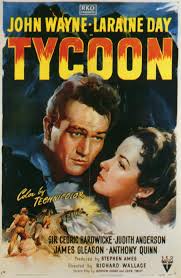
TYCOON
US, 1947, 129 minutes, Colour.
John Wayne, Cedric Hardwicke, Laraine Day, James Gleason, Judith Anderson, Anthony Quinn, Grant Withers.
Directed by Richard Wallace.
Tycoon is a John Wayne starring vehicle. Set in South America, it show engineers blasting a tunnel through the Andes for a railroad. It has a contemporary '40s setting, post-war when the film was made.
The film was in colour, has studio sets as well as Californian locations standing in for the Andes. The situations and characters are as expected - and the film is very long.
Wayne is his usual self, blend of hero and hero suffering decline before redemption. Laraine Day is heroine, Cedric Hardwicke stern as her father, Judith Anderson rather more mellow as the companion. There is a good supporting cast led by Paul Fix and Anthony Quinn.
Colourful, but rather tedious and drawn out at times to watch.
1.John Wayne action adventure? Wayne as a star? Tough situations, characters, decisions?
2.Colour photography, use of studio sets, locations? Musical score? Echoes of Latin America?
3.The title, the focus on Frederick Alexander? His influence on Johnny Munro? The behaviour of tycoons? Money, investment, corner-cutting, decisions?
4.South America, engineering progress, railroads, tunnels, bridges? The mountains and the rivers? Weather? The towns and the cities? Americans in South America? The locals, their lifestyles, work, festivities? Authentic colour?
5.John Wayne as Johnny Munro, his work, engineering skill, loyalty of the men? The clashes with Alexander? With Ricky? The attraction towards Maura, following her into the church, the conversation, at home, her father's reaction? Getting lost with her? Alexander forcing them to marry? Love, the clashes at the tunnel site? His impatience, concern? The men, the collapses, injuries and hospitals? Growing cynicism towards Alexander? The final collapse of the tunnel? Maura's leaving him? His drinking? Plan for the bridge, cutting corners, the reactions of the men, Pop and his telling him the truth? Punches? The crisis with the water, reinforcing the bridge, saving the bridge? Driving the train? Munro coming to his senses? Reconciliations?
6.Frederick Alexander as the severe tycoon, his presence in South America, his dead wife, his daughter? His severity with her? Rules, his house? Criticisms of Johnny as an engineer, as courting his daughter? His forcing them to marry, hoping they would separate? His relationship with his secretary? The clash about the tunnel, the meetings, costs? The decision about the bridge, admiring Johnny? The crisis with the water, withstanding the storm? Success? Reconciliation with his daughter?
7.Maura, the narrow upbringing with her father, the companion? Church, discussions with Johnny, lost, in love? The marriage? On the site and her trying her best, finding it difficult, relating with the men? The tragedies? The young boy, Pop? Her leaving, the social evening? Supporting Johnny at the end, reconciliation?
8.Ricky, place in the family, engineering, deals, extravagant? His introducing Johnny and Maura yet his criticism? His involvement in the work? The crisis with the water?
9.Pop and the other men? As characters, Americans in South America, work, skills? Loyal to Johnny? Turning against him, clashes, fights? Injuries? Deaths? The young boy and his support?
10.Memories of those days of engineering and building? Tunnels and bridges? The pioneers of the past? And the conventional stories that dramatised those days?
Published in Movie Reviews
Published in
Movie Reviews
Tagged under
Saturday, 18 September 2021 19:21
Two Worlds of Angelita, The
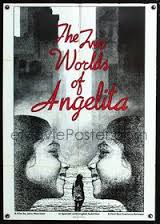
THE TWO WORLDS OF ANGELITA
US, 1983, 75 minutes, Colour.
Marien Perez Riera.
Directed by Jane Morrison.
The Two Worlds of Angelita is a small-budget independent film made in Puerto Rico and New York. It was made in English and Spanish by writer-director Jane Morrison. It highlights the background of the migrants in Puerto Rico, their way of life and expectations, the transition to New York City, its hardships. It is a perceptive look at a contemporary American problem, the Hispanicisation of New York City.
1.Interesting and entertaining? Authentic? Perceptive?
2.The atmosphere of Puerto Rico, the towns and villages, the home, comparative poverty? The contrast with New York City, the streets, the apartments, jobs, opportunities? Musical score?
3.The film made in both English and Spanish - highlighting the experience of the migrants?
4.Details of like in Puerto Rico, Angelita and the other children, her father gone to New York City, his wife trying to manage, the mother-in-law and her sewing, Manolo and the boys, the future? The experience in Puerto Rico, especially with the contamination of the waters and the fish?
5.New York City and the garbage, the change for the Puerto Ricans, the small apartment, trying to get furniture? The house, friends? The ugliness and being confined?
6.The difficulty of walking in the streets for the children, playing? New relationships in the city, fights? The difficulties of school, language? Mr Shaw and his severity? Mrs Perez and her help? The headmaster?
7.The father trying to make ends meet, jobs, failing the test, the humiliation as a cleaner, his resignation? His macho principles? The mother getting a job, succeeding? Her change of heart and decision?
Published in Movie Reviews
Published in
Movie Reviews
Tagged under
Saturday, 18 September 2021 19:21
Two Hands
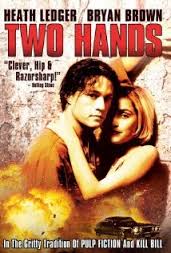
TWO HANDS
Australia, 1999, 102 minutes, Colour.
Heath Ledger, Bryan Brown, Tom Long, Rosie Byrne, Suzie Porter.
Directed by Gregor Jordan.
Two Hands won the AFI award for best film of 1999. The acting awards were won by Heath Ledger for best actor and Bryan Brown as best supporting actor. Gregor Jordan, who had made award-winning short films, then went on to make an international feature.
Two Hands shows a picture of petty criminals around the King's Cross area of Sydney. However, these criminals are also vicious. Heath Ledger portrays a naive young man (whose brother has already been killed by these criminals) who is a bouncer at a nightclub and accepts a small job carrying money to Bondi Beach. However, a series of coincidences means that he loses the money, the young kids who stole the money go on a spending spree, but one of them is killed in a car accident by the criminals. In the final confrontation, Heath Ledger does not have to shoot the criminals - the young girl who had witnessed the death of her friend and the callous disregard of the criminals, shoots them all.
There is a chorus device used by Jordan, a dead man who utters a mixture of ocker rough language insights into human nature as well as quoting the poetry of William Blake and talking about Ying and Yang - and that there is good in every evil person and some evil in every good person.
The film is an odd mixture of serious gangster settings in Sydney, farcical aspects of a bank robbery and how petty criminals should not be glorified, but seen for the ordinary (and sometimes less than ordinary) people that they are. Heath Ledger was to go on to international success with Ten Things I Hate About You, The Patriot and A Knight's Tale.
1. The film winning the AFI award for best film, director, acting? Its popularity with the Australian public?
2. The Sydney settings, King's Cross, the suburbs, homes, clubs, Bondi Beach, banks? The atmosphere of realism about the setting? The contrast with Michael and his appearing from the dead, his facial appearance, his mystical presence, especially in the train? His language, quoting Blake, talking about Ying and Yang? A ghost helping his brother? Final disappearance as the hands come out of the earth to take him down - to Hell?
3. The title and the focus on working with two hands, the skills of two hands, people needing hands for help? Jimmy and his skill with his hands, the possibility of a future in building boats?
4. The prologue: the lurid and vivid colours and music of the credits sequences? The intimations of flame and fire? The group taking Jimmy to be killed? The ghost watching and his comments?
5. Jimmy as a bouncer, no family, not having been in contact with his mother, his dead brother? Working at the club with Les, urging people into the clubs? Seeing the girl from the country, talking, attracted, the photos? The promise to look at the photos when they were developed? Pando and his promising the job? His trusting in Pando and wanting a job amongst the crooks? His skills at boxing - the glimpse of his winning the round (in prison?)? His flat, talking to the neighbourly woman? A good-hearted person? The job, naive questions, taking the car? The death of the woman in the flat and his not being able to deliver the money? Going to the beach, thinking he saw the girl from the country? The swim, the robbery? His desperation?
6. Jimmy going to Deirdre, her help? Warnings? The happy domestic atmosphere with Deirdre's mother? The children? The irony of the petty crims bringing their kids for Deirdre to look after them? (And Pando's phone calls to his wife, love for his children, the scene where he was working with his son on origami?) The plan to rob the bank, Deirdre and her warnings, giving the basic information about the vulnerability of banks, the two criminals and the plan? The phone call to the girl? Going to see her, the pub, being chased in the street, the monorail? The criminals getting Jimmy - and the repetition of the scene where they're about to kill him? The irony of the laundered bullets and his fight and escape? Impressing Pando and his group - and even offering Jimmy a job?
7. The bank robbery, the plans, the simplicity - but the callousness of urging to kill a policeman because he would shoot you? The robbery, the violence, the farcical aspect with the criminal knocking himself out, their having to drag him out of the bank, the getaway and the police shooting the tyres and wheels? Taking the car - and the irony of the spotters for the radio competition choosing that car? The escape? Jimmy and his going back to his flat, the old woman, the girl being there? The promise of the job on the north coast, building boats, going to the airport and getting the tickets? Happy ending?
8. Pando and his gang, criminals, callous, greedy? Power? Yet their limitations of brain power, muscle? Petty criminals in a small pond? Their brutality, murders? Callous talking about them? The irony of playing Scrabble, Pando and his son? Acko and his concern about his car, pursuing Jimmy, the death of the young man wanting his car at the repairs, killing him in the harbour? The killing of the young boy and the callous attitudes?
9. The kids, pickpocketing, in the streets of King's Cross? Getting the money, the spending spree? The accident and the boy being neglected, the girl not giving information to the police? Her sadness, getting the gun, shooting the gang?
10. The girl from the country, naive, awkward, inexperienced? Attracted to Jimmy, the photos, the hotel, the chase, Pando giving her the money for the taxi? Her going home, her deciding to stay and taking Jimmy to her uncle for the future?
11. Deirdre, Michael's wife, with the kids, her mother, the plan of the robbery, helping Jimmy?
12. The device of the ghost, the blend of realism and fantasy? His appearance, manner? Poetry? His helping his brother, his final disappearance?
Published in Movie Reviews
Published in
Movie Reviews
Tagged under
Saturday, 18 September 2021 19:21
Tuskegee Airmen, The
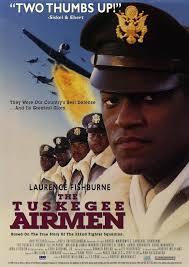
THE TUSKEGEE AIRMEN
US, 1995, 106 minutes, Colour.
Laurence Fishburne, Cuba Gooding Jnr, Andre Braugher, Allen Payne, Malcolm- Jamal Warner, Courtney B. Vance, Christopher Mac Donald, John Lithgow, Daniel Hugh Kelly, Rosemary Murphy, Ed Lauter.
Directed by Robert Markowitz.
The Tuskegee Airmen is a tribute to the Fighting 99th, the first squadron of black airmen in World War Two. It is a film showing the prejudice against black Americans at the time, their path being thwarted in becoming recognised airmen. The film concludes with them being requested to be escorts in the bombing of Berlin.
The film is conventional in its presentation of the characters, their training, the difficulties, the aerial warfare, heroism and deaths. War footage is included. There are also photos, especially in the final credits, of the actual Tuskegee airmen.
A strong cast of American black actors brings this episode of World War Two alive.
1.The tribute to the black American airmen of World War Two? A memoir after 50 years? The use of actual footage? Of the photos of the actual airmen?
2.The impact for an American audience, of the '90s? Memories of war? Prejudice?
3.The history of the involvement of America in the war, the aftermath of Pearl Harbor? The selection of the black trainees? The exams and their success, their academic backgrounds? The detail of their training? Their ambitions being thwarted? Their heroism?
4.The introduction to the characters on the train going to Tuskegee? The experience of prejudice and having to move for the German prisoners? The bus, the arrival, the usual routines, the officers and the tough stances? The varying reactions of the men? Having to take the exam again? The training, the bonds between the men?
5.The white officers? Rogers and his sympathy? Joy and his prejudice? Verbal attacks, making it difficult for the men, the second exam? Glen as the liaison and his being involved in the decisions? The attitude towards the experiment with the airmen? The comments about "you people, serving your people", the chain of command from the President to the cadets? Life on the base?
6.Success and failures in training? The ambitions of the men? The dangers?
7.Hannibal Lee as leader, his presence, Iowa background? His attitude towards Major Joy? His friendship with the men, supporting them, urging them not to quit? His friendship with Tank and the service of his own plane? The sequence of his landing and the chain gang and their response?
8.Lieutenant Glen, liaison officer, his Canadian experience, his agreeing with the dismissal of Peebles? Tough stances, having no friends?
9.Walter Peebles, his background, his showing-off flight? His leaving? Taking the plane, the crash? Arguments about the blame for his death?
10.Billy, the Harlem background, training, friendships, survival, the bond with Hannibal? Their combat and escort work together? His being hit, dying, posthumous medal?
11.Cappy, his background, success? His being blamed by Senator Conyes? His death?
12.The success of the experiment, the joy of the graduation? Acceptance into the American Air Force?
13.The senate inquiry, the psychological reports about blacks and their fitness for air service?
14.Eleanor Roosevelt, her arrival at the base, her sardonic attitude towards the officers, her ability to charm people, going on the flight with Hannibal, being photographed?
15.Tank, friendship with Hannibal, the support group taking care of planes?
16.North Africa, the racism? The nature of the missions, the strategy? The seeking of glory? Wanting combat? Davis and his leadership of the men?
17.The Washington hearings, the bias of Senator Conyes? His visit to Africa and his antagonism? General Stevenson and his presence? Davis and his speech - especially about being American and being accepted only when the mood of the white people suited? The patriotic tone of the speech?
18.The transfer to Italy, combat, the escort work?
19.The reaction of the white pilots to being saved by the blacks? The Texas man not wanting to acknowledge their presence? His later change of heart and requesting them for the mission to Berlin?
20.The achievement, the medals, the honoured place in World War Two?
Published in Movie Reviews
Published in
Movie Reviews
Tagged under
Saturday, 18 September 2021 19:21
Tudor Rose
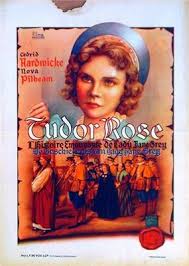
TUDOR ROSE
UK, 1936, 78 minutes, Black and white.
Cedric Hardwicke, Nova Pilbeam, John Mills, Felix Aylmer, Leslie Perrins, Frank Cellier, Desmond Tester, Gwen Frangcon Davis, Sybil Thorndike, Martita Hunt, Miles Malleson, John Laurie.
Directed by Robert Stevenson.
Tudor Rose is a more lavish production than might have been expected from Britain in the mid-'30s. It is the story of Lady Jane Grey, the Tudor Rose, who was chosen for political purposes to succeed Edward VI and became a scapegoat for the clash between Catholics and Protestants. She was also the victim of the Seymour family and their influence over Henry VIII and Edward VI. She and her husband Dudley were executed - seeming innocents, pawns of aristocratic power struggles.
Nova Pilbeam (Hitchcock's Young and Innocent) is an attractive Lady Jane. John Mills plays Lord Dudley. There is a strong supporting cast including Cedric Hardwicke and Felix Aylmer. The story was used in a rather more elaborate version from the '80s, Lady Jane, with Helena Bonham Carter and Cary Elwes, directed by Trevor Nunn.
1.A British historical film of the '30s? Its popularity in its time? Perceptions of British royal history?
2.The black and white photography, the elaborate sets, costumes, musical score? Re-creation of the Tudor period?
3.The title, the focus on Lady Jane Grey, perceptions of her, her memory? The innocent Tudor victim?
4.The historicity of the film: the reign of Henry VIII, the Reformation, the heir to Henry VIII, Edward VI, Catherine and Elizabeth? The role of the Seymours and their influence, especially over Edward VI? The Dudleys, the Greys? Users and used?
5.The film's dramatising of the politics of succession? Edward VI and his illness? Lady Jane Grey and the choice, the manoeuvres, the battles? Mary and the legitimate succession, the confrontation with the Seymours and the Dudleys, her encounter with Jane - and her regrets at the execution of Jane for treason?
6.The period of the Reformation and the Tudors, 16th century divine right of kings, male succession, power struggles and emerging nationalism?
7.The portrait of the Seymours, their plots, sinister? Warwick? Characters, their plotting, deaths? The influence on Edward VI and their downfall?
8.The picture of Edward VI, the young boy, not knowing what was happening around him, his attempts at ruling, the protectorate, the influence of the Seymours? His illness and collapse?
9.Jane Grey and her parents, quietly in the country, her encounter with James Dudley, the plans of the parents, the money and status deals, her not willing to be queen? The love for James, the separation from him? The visit with Mary? The sentence to death, the pathos of her execution?
10.James and his family, their influence, using him and their ambitions for a marriage with Lady Jane? Warwick and the plots? The collapse of the Revolution? The accession to the throne of Mary and her vindictive attitude towards those accused of treason?
11.An interesting glimpse of 16th century politics and religion?
Published in Movie Reviews
Published in
Movie Reviews
Tagged under
Saturday, 18 September 2021 19:21
True Blue
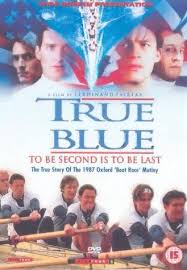
TRUE BLUE
UK, 1996, 110 minutes, Colour.
Johan Leyson, Dominic West, Dylan Baker, Josh Lucas.
Directed by Ferdinand Fairfax.
True Blue is a film about an Oxford scandal, the mutiny of the Oxford boatrace teams in 1987. It was based on a book written by one of the chief protagonists, the coach, Daniel Topolsky (played by Johan Leysen).
The film focuses on the personalities of the British and the Americans (especially played by Dominic West and Josh Lucas). The film shows a number of meetings where boatmen clash, where the coach is ousted and reinstated, where there is discussion about the spirit of Oxford rowing, the importation of Americans.
The film has a lot of scenes of rowing, training. Many thought it was the successor to Chariots of Fire but the film does not have the lyricism and the idealism of that film.
However, it is a very British look at a very British situation, with the perspective of the difference between Britain and the United States. The film was directed by Ferdinand Fairfax, who has had a mixed career as a film director both in Britain and in New Zealand.
1.A film about a sport, a club and an organisation, human nature and conflict? The will to win?
2.Panavision photography, the Oxford locations, the river? The interiors of the college? Pubs? The change of seasons? The musical score?
3.The title and the focus on Oxford and Cambridge? The boat race? The blue blood and the true blue blood?
4.The film based on a true story, the atmosphere of the '80s? The facts, the clash, the Americans and the British? The point of view of the coach and his writing the original novel? Donald McDonald? as technical adviser to the film? An Oxford interpretation?
5.The opening with Donald and the mountains, the rowing, the transition to Oxford, the 1986 race, the effort, Cambridge winning, the effect of the loss, morale, the response of the coach, the subsequent meetings, the nature of the rowing club and its authorities, members? The rumour about the sacking of the coach? The possibilities for the next year? The Americans?
6.The zeal and ambitions of the rowers, especially Donald and Ross? The discussions about being president of the club? Donald becoming president? The ethos of Oxford, the race, the room with the oars, the long tradition?
7.The decision to recruit the Americans? Ross and his tactics, going to Warren and Chambers? The other Americans? Their American style, reputation, the Olympics? Personal success? The American characters and their style?
8.Americans versus British? In the context of Oxford, arriving, the car, shouting out to the women? The college, old-fashioned, the cold, the gas meter? The discussions? Their response to Topesco? Their demands for democracy and contribution to the plans and the regimes? The subsequent politicking on their part and talk about impeaching presidents? Loud, banding together, defying Topesco? The program, the training, their condemnation of it as old-fashioned? Their meetings, strikes? The attempts at compromise? The relationship with Donald, as president, in liaison with the authorities, his taking their side, the decision to oust him after the competitive race with Ross?
9.The contrast with British traditions, the pubs, the practical jokes, study, homes, parties?
10.The portrait of training and its repercussions? The reflections on the 1986 loss? The ethos of winning? The significance of individuals compared with the team?
11.The character of Don, diplomatic or not? His relationship with his wife and child? The friendship with Michael the Jesuit? The birthday party? His taking a stand against Topesco, yet supporting him, their conversations? The pressure by the Americans, the strike, his taking sides? Their ousting him after the competitiveness with Ross? His attitude towards the second crew, the decision to use them? Their complaints against him but their decision to follow? The interactions with Dan and the final decisions to use the second crew?
12.Ross, American, individualist, a proud man, competitive, doing his best under pressure, his casual approach to timetable, finally on the line, comparison with Donald, trying to persuade him to compromise? His being ousted, supporting the team on the bridge at the end?
13.The Americans, their manner, interactions, ganging together, talk of democracy, against the regime, the training, at their own time? Their finally being outmanoeuvred and their resentment? Leaving? Individuals rather than team members?
14.The presentation of the British types, as students, friends, their reactions to the Americans, the training, the reaction to Donald, their final support, working together as a team?
15.The rowing club officials, their fickle attitude towards the Americans, wanting to win?
16.Dan Topesco, his character, presented as indecisive? Lacking diplomatic tact? The importance of the team, faced with the strike, the compromises, wanting to resign? The American's support at the dance, yet turning against him? The spirit of Oxford, his own career, the final team, the training, getting them to support each other, the final race and triumph?
17.Michael the Jesuit, friendship with Donald, the meeting and his rhetorical and emotional speech and its carrying the day? The vote?
18.The final sequences of training, the actual race, the manoeuvres, using the weather, the triumph of the win?
19.A very masculine film, competitiveness and winning? The importance of competitive issues in sport, associations, organisations? The ethos of winning is all?
Published in Movie Reviews
Published in
Movie Reviews
Tagged under
Saturday, 18 September 2021 19:21
True Blood
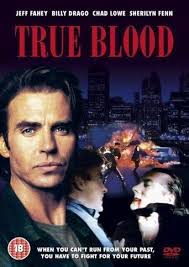
TRUE BLOOD
US, 1989, 100 minutes, Colour.
Jeff Fahey, Chad Lowe, Sherilynn Fenn.
Directed by Peter Maris.
True Blood is a small-budget film about New York gangs. It has the gritty tone of the streets, the violence of the clashes between gangs and gangs and police. However, it has a human touch with the story of the two brothers and their struggles. Jeff Fahey (a look-alike for Paul Le Mat) is the hero, Chad Lowe is the younger brother, Sherilynn Fenn (the sexpot of Two Moon Junction) gives a credible performance as the sympathetic waitress. James Tolken plays, as in so many films, the police lieutenant. Not bad of its kind.
1.A picture of New York gangs, the police, the human background?
2.New York city, the streets, violence? The '70s and the '80s, the same and the change? Action sequences? Musical score?
3.The title and its meaning: the two boys, the bonds of blood, their name?
4.Ray as a young member of the gang, love for Donny, offering hopes in Wyoming, the clash with Spider, the fight, the murder of the policeman on the roof, the chase, the car, the station and Ray's leaving Donny, getting on the train?
5.Ray and 10 years in the Marines, seeking Donny, the changes in the streets, discussion with Bob, Donny and the gang, Spider? Getting work from Frank? Friendship with Jennifer, talk about poetry? Finding Donny wounded, sewing him up, the friendship with Jennifer? Eluding the police? Frank letting him go? Going to the police precinct, the deal with Hanley, the truth? Confronting Masters, being shot? The reconciliation with Donny? Going to Wyoming?
6.Donny as the little boy, left at the station, member of the gang, the influence of Spider, clashing with Ray, following him, the robbery and his being wounded, his being sewn up, leaving, the apology to Jennifer, talking things over with her, the pursuit, finding Ray, shooting Masters, the deal, leaving with Ray?
7.Jennifer and her work, her explanation of her tough past, tough, the poetry, helping, the talk with Donny, being terrorised in her apartment? The happy ending?
8.Hanley, the initial chase, his anger, the pursuit of Ray, staking out the house, the escape in the garbage truck? The deal? The finale?
9.Spider and his gang, ugly, vengeance, interrogating Bob and burning him? Confrontation with Ray, his being shot?
10.The sentiment underlying the film, the relationship of the two brothers, with Jennifer, Frank and his help? The tough police and giving people a break? The blend of toughness and sentiment?
Published in Movie Reviews
Published in
Movie Reviews
Tagged under
Saturday, 18 September 2021 19:21
Trottie True
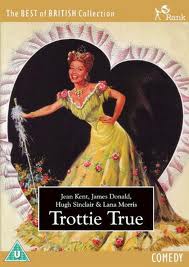
TROTTIE TRUE
UK, 1949, 98 minutes, Colour.
Jean Kent, James Donald, Hugh Sinclair, Bill Owen, Andrew Crawford, Lana Morris.
Directed by Brian Desmond Hurst.
Trottie True is a light British period comedy drama. It is typical of so many of the films coming from Britain in the late '40s and early '50s. Jean Kent, often the villain, has a much more sympathetic role as the heroine. The supporting cast includes a young James Donald and Michael Medwin, Lana Morris and Hattie Jacques appearing in a small part. The setting is the turn of the century, the colour photography and costumes are attractive. The story is slight - a rags to riches story and the testing of true love. Direction is by Brian Desmond Hurst, director of many British films at this period.
1.The title, the focus on Trottie, portrait of a woman at the turn of the century, in her period?
2.British atmosphere, costume design, style and flavour, the period? Colour photography? Songs and the musical score?
3.The flashback structure, Trottie's decisions, the ending and her going with her husband?
4.The little girl, her parents, the party, the theatre, her audition, performance - and her standing up to the heckling audience? Joe and his friendship, looking after her? Her success, growing up, inviting people to sing, a star of the provinces? Her fellow workers? The invitation to London, to the Gaiety Theatre?
5.A woman of ambitions, an entertainer? Sid and the balloon, crashing into the garden, his clothes being mended and the meal? His accompanying Trottie, the attraction, sharing ideas and vision, falling in love? Opportunities for Trottie, the entrepreneur and the dinner, the clash with Sidney, the decision to break with him?
6.Her girlfriend at the gaiety, sharing notes, jewels, attentions of men, the aristocracy?
7.Landon and his friend, their views on the Gaiety Girls, exploiting them, the meeting, sharing, the proposal, Trottie's accepting, the wedding, her singing and entertaining the guests? Her in-laws and their disdain, acceptance of her? Her fitting into this social life?
8.Her friend's wedding, the fuss, the visitors, Trottie thinking and remembering her story - and going off with her husband?
9.A sketch of a period, people, opportunity? British tone?
Published in Movie Reviews
Published in
Movie Reviews
Tagged under
Saturday, 18 September 2021 19:21
Troop Beverley Hills
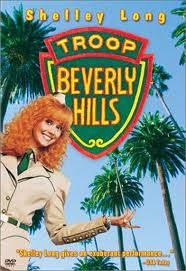
TROOP BEVERLEY HILLS
US, 1989, 106 minutes, Colour.
Shelley Long, Craig T.Nelson, Stephanie Beacham, Mary Gross, Betty Thomas.
Directed by Jeff Kanew.
Troop Beverley Hills is a star vehicle for Shelley Long. She plays a Beverley Hills socialite who is in charge of a team of Wilderness Girls. If audiences have seen Private Benjamin or any other film like it, they will be in no doubt as to how Shelley handles her troop of spoilt and indulged girls - except for the fact that she teaches them survival techniques for the hotels and shops of Beverley Hills.
The film is slight, pleasantly amusing. Shelley Long is a commanding screen presence and dominates Craig T. Nelson as her estranged husband but not quite Betty Thomas as her strong arch enemy in the troop. Mary Gross has an amusing supporting role - sent to infiltrate the troop. Direction is by Jeff Kanew, whose films range from the sombre Natural Enemies to the action Eddie Macon's Run to the humour of Tough Guys and, surprisingly, The Revenge of the Nerds.
1.Enjoyable comedy? Social comment and satire? Piece of American style humour?
2.Los Angeles, Beverley Hills and its locations, wealthy homes, shops, hotels? The surroundings? Musical score and songs?
3.The title and audience expectations? Poking fun?
4.Phyllis and Shelley Long's screen presence? Her application for leadership of the Wilderness Girls and her gossip, spending money, thriftiness? Her lavish style? Cars and clothes? Her daughter? Estrangement from her husband? Their arguments about what had happened in their marriage? Her jealousy and spying on him? Entertaining the girls - and her range of incongruous costumes? The meetings? The clash with Valda at the meeting? Her decision to work with the girls? Fred's scepticism? The getting of the uniforms, getting hers tailor-made? The outing and its raining, roughing it in style? The hotel, telling the stories? Valda's reaction? Getting her underling to infiltrate? The spying, the photos - but success? Teaching the girls survival skills in Beverley Hills - and the satire on their wealth, being spoilt? The girls banding together? Phyllis and her success? The selling of the cookies - and their being outwitted? The decision to win the competition - roughing it, keeping going, winning the first competition, the clash with Valda? The breaking of the bridge? Seeing Valda injured, the decision to bring her back? Winning the race, the last one across the line? The example for the girls - charity and concern? Fred's admiration? Her bond with her daughter? Happy ending?
5.The girls, their wealthy background, actor fathers, overseas trippers? The Asian dictator and his wife? The lonely girls? Together, the troop, enjoying Phyllis's company, the stories, being spoilt, the shopping? The clash with the rugged Wilderness Girls? Working together, their final victory? The danger on the log across the river - symbol of achievement?
6.Fred, his ambitions, support by Phyllis, the advertisements? Alienation, her shopping? His moving out, trying to remind her of what she was? His girlfriends - and the socials, the parties? Exciting her jealousy? Supporting her and her achievement, the reconciliation?
7.Valda, the caricature of the tough Wilderness Woman, rousing on her daughter, her daughter calling her `Sir'? The meetings, the clash with Phyllis? At executive meetings? Her underling and the infiltration? Growing exasperation, visiting the hotel? The cookies and her techniques? The photos? The competition, her wanting to win, going with the girls, her injuries, being carried back, being sacked?
8.Valdaa's underling, under her command, the infiltration, moving in with the family, taking the photos, seemingly compromising? Reporting back? Her decision to throw the camera away, support Phyllis, share in the success?
9.The parents and their wealth, manner of living, holidays, relationship with their daughters, promises - and not fulfilled promises? Their daughters' achievements, at the end and success?
10.The light touch, expected comedy, Beverley Hills style, Shelley Long's fashions - and the number of guest stars turning up: Pia Zadora, Cheech Marron etc?
Published in Movie Reviews
Published in
Movie Reviews
Tagged under